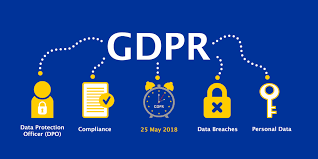GDPR, General data protection regulations, refers to personal data protection and privacy laws for users and organizations, especially those in the Europeans Union. GDPR laws are considered the strictest laws regarding data privacy, safety, and collection. These laws are applied to all companies involved in selling or storing personal information about customers. In this blog post, we will discuss GDPR and why compliance with GDPR is essential for your business.
What are the seven GDPR principles?
Before going any further, it is essential to update you on the seven principles of GDPR. It is important to learn about these principles to show your compliance.
- Lawfulness, Fairness, and Transparency
Each word in the first principle of GDPR has its meaning. The three components of Lawfulness, Fairness, and Transparency play their role.
The word lawfulness calls that the organization collecting the personal data should collect it with the user’s consent. The most legal and common way to collect data is by getting the customer’s consent. The consent can either be verbal or written.
Fairness means that the organization collects the user’s data for good interest. A good interest means using the data for legal reasons, such as an organization can use the data to collect customers’ likes and dislikes.
Transparency means the firm should be clear about how, what, and why it processes the data.
This principle states that all data must be processed and collected legally with the user’s consent. The data subject must know precisely what information is being collected, how it is stored, and how long this data exists in the business’s system.
- Purpose limitation
The data collected by the organization must only be processed for the intended purpose. The purpose of use must be specified and legitimate. The controller cannot collect or process data outside the realm or sense. If the business is caught using data for any other purpose than stated, it would be recorded as noncompliance with GDPR.
- Data Minimization
Data minimization refers to refraining businesses from keeping data from lying around in their systems. This means that if a firm is not using any data, it should be erased while informing the users. Many businesses tend to keep unwanted data lying around and refrain from using it. Doing so would be an act of noncompliance with GDPR. Therefore, it is important only to collect minimal and accurate data for use.
- Accuracy
The data collected by the firm should be precise and accurate. There should be processes to guarantee that all the inaccurate data is rectified or deleted immediately.
- Storage limitation
This principle of GDPR orders the firm to delete all personal data after it has been processed. A firm should not store the personal data of its users which is no longer in use. Additionally, the organization collecting the data must explain to customers how long they plan to keep their data. As well as ensuring the deletion of data after it has been utilized.
- Integrity and Confidentiality
This GDPR principle emphasizes confidentiality and integrity. Confidentiality refers to keeping the data secure, which means that only authorized people should have access to the data rather than anyone. Doing so builds trust between the firm and customers and limits unnecessary data loss. Integrity refers to collecting the data as accurately and minimally as possible and keeping it safe, such as from hacking.
- Accountability
Accountability is the last of the seven GDPR principles. Accountability refers to a firm taking full responsibility for the data they process while complying with all the laws. Further, the firm should be able to show them proof of compliance with these regulations. The evidence can be in the form of documentation. The GDPR regulators know that a firm can easily verbally say they are following GDPR without actually doing so. That’s why a level of accountability is required.
The eight fundamental rights of GDPR
Under GDPR, individuals have:
- The right to access: This means that individuals have the right to request access to the collected personal data. Individuals are also allowed to ask the organization how their data is processed. The company is obliged to provide all the details requested.
- The right to be forgotten: If the customers are no longer the customer and have withdrawn their consent, then it is their right to ask the organization to delete all their data. In response, the organization should delete that particular customer’s data.
- The right to data portability: Individuals can request data transfer from one service provider to another.
- The right to information: The data subjects have the right to know where their data is at all times.
- The right to restrict processing: When the data subject feels like it, they can stop their data processing. The organization would have no choice but not to use that user’s data anymore.
- The right to correction: Individuals can add or remove any information in their data whenever they want.
- The right to object: This means that the data subject has the right to stop processing their data. The organization is obliged to prevent data processing as soon as it is requested.
- The right to be notified: If the subject’s data is breached, it is the company’s responsibility to inform the individual as soon as possible.
How to comply with GDPR principles?
- Training: An employer is responsible for the action of every member of their team. In most cases, a group of people is responsible for protecting data and its processing. Thus, it is equally essential for each and every member of the group to be competent enough to perform their job without any problems. In such cases, the employer is responsible for providing employees with proper training, such as GDPR awareness training. These training courses help the trainees understand the principles of GDPR and how they can comply with them and ensure that the data is protected. GDPR awareness training helps the company from breaching the data and introduces the limitation of handling personal data. Hence providing GDPR training has to be one of the primary steps a firm should take to be GDPR compliant.
- Data protection impact assessments: An organization should always conduct a data protection impact assessment whenever it collects data. It allows the company to analyze and identify all the risks associated with data processing.
- Auditing all personal data: It is vital that a firm document all the personal data that they hold, where they obtained it from, and with whom they are sharing it. Auditing helps the business review its activities and how the company is handling the data. Further, Auditing provides a business with areas for improvement.
Why is GDPR compliance substantial?
GDPR is a set of regulations that entails organizations to protect customers’ personal data and privacy. With the growing concerns over data collection and safety, it is now more important than ever to comply with GDPR. Here are some of the importance of GDPR for businesses:
- Legal compliance: GDPR is a legal requirement for businesses in many countries. By complying with GDPR principles, a firm can save itself from legal issues, fines, and reputational damage.
- Protecting customer data: GDPR helps businesses protect their customers’ data by ensuring that data is collected and processed in a lawful, transparent, and secure manner. By protecting the data, a business can prevent data breaches, and cyber-attacks, which can result in financial loss and damage to reputation.
- Building customer trust: GDPR compliance can help businesses establish trust with customers. When a company is transparent about its data activities, it attracts attention from the customer.
- Competitive advantage: Customers are likely to consent to businesses that comply with GDPR. This means that companies complying with GDPR tend to get more customer base, which gives them a competitive advantage.
- Good data management practices: GDPR encourages businesses to adopt reasonable data management practices, such as data encryption, access controls, and regular data backups. These practices help companies to protect the data of customers and prevent data breaches.
- Risk Management: GDPR requires businesses to conduct risk assessments and implement appropriate security measures to protect data. These practices help companies to identify and mitigate potential risks to customers’ data, which reduces the likelihood of data breaches and cyber-attacks.
Conclusion
In conclusion, the General Data Protection Regulation (GDPR) is an essential tool for protecting the privacy rights of individuals. GDPR is a legal requirement for businesses in many countries, as data protection is not taken lightly. This guide has provided a detailed introduction to the seven principles of GDPR and a data subject’s eight fundamental rights. Besides that, this blog has highlighted the steps and the importance of GDPR compliance to those businesses. Compliance with GDPR helps a company avoid legal fines, protect customer data, build trust and reputation, and give the business a competitive advantage. By complying with GDPR, companies can demonstrate their will to protect customers’ privacy. So if you are running a business that deals with personal data, it is essential to ensure GDPR compliance, avoid potential risks, and gain the trust and loyalty of your customers.
Meta Description: Learn why GDPR compliance is crucial for businesses that deal with personal data. Find out how GDPR can protect customer privacy and improve your reputation.








